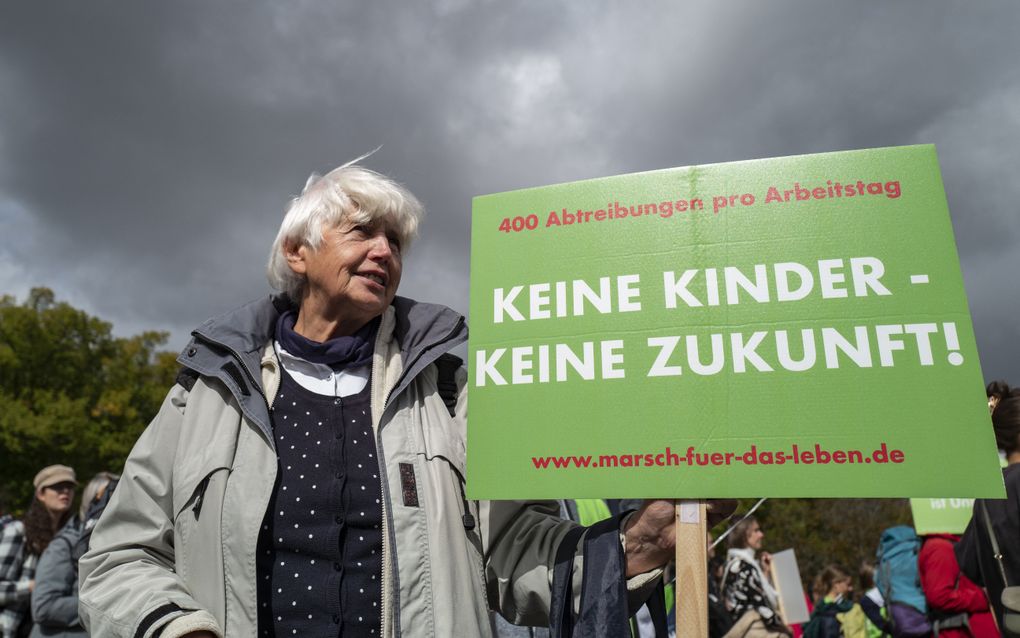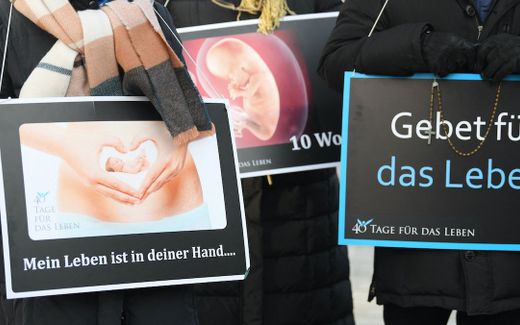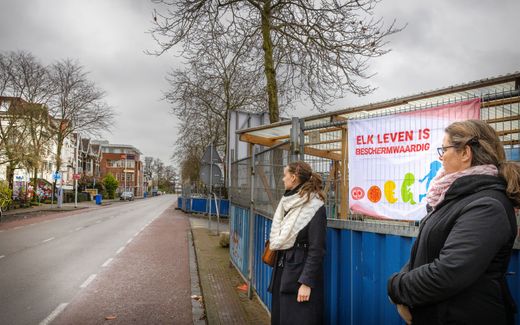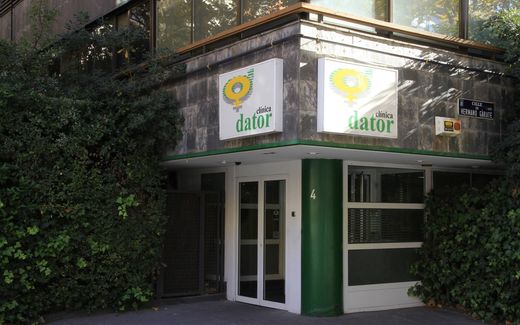Buffer zone abortion clinic remains a balancing act
12-11-2022
European Union
Leendert de Bruin, RD

Photo AFP, John MacDougall
European Union
For abortion advocates, it cannot end soon enough: demonstrations at abortion clinics. In several European countries, they, therefore, try to keep pro-life activists at bay through buffer zones. Their successes vary.
Women are confronted with plastic foetuses upon entering an abortion clinic. Or with baby clothes hanging around the entrance. Abortion advocates frequently point to pro-life protesters who have allegedly overstepped boundaries in recent years. They are intimidating practices, is the recurring criticism.
For abortion advocates, this is a reason to push for a buffer zone around abortion clinics. That area with a radius of several dozen metres becomes off-limits to protesters.
Spain
Extreme –and incidental– actions, in particular, cause tensions. The Spanish organisation Rescate offered women food and drink at the clinic entrance, hoping they would consume some. Since the procedure calls for a sober stomach, an abortion then had to be postponed.
For a majority of Spanish lawmakers, enough was enough. In April, the Senate passed a law criminalising harassing a woman on her way to an abortion clinic. Anyone who acts "annoying, insulting, intimidating or threatening" risks three to 12 months in jail or community service for several dozen days. With this, any demonstration at Spanish abortion clinics seems to be banned.
However, the bishop of the south-eastern Orihuela-Alicante diocese did not let the new legislation -a proposal by the centre-left government- stop him. José Ignacio Munilla participated in a prayer campaign for an abortion centre in Alicante last week. He tweeted a picture of himself and other prolifers standing together outside a clinic. It is still unclear whether such actions fall under the scope of the law.
"Praying is not a crime," a spokesperson for the group Right to Life previously revealed in response to the new law. In doing so, she echoed the sentiments of many pro-life activists, including those outside Spain. These, in their own words, actually hold peaceful protests. They deny being intimidating and say they only address women who approach them. In addition, the activists point to examples of women who have gone back on their decision and do not regret it.
Great Britain
Measures against pro-life activists go not as far in Great Britain as in Spain. But there, too, there are calls for national legislation for buffer zones. In October, a large majority of the UK House of Commons voted to amend the Public Order Act to cordon off abortion clinics in England and Wales from protesters. The proposal has yet to pass through the House of Lords.
Under the proposed law, harassing or obstructing a woman in the vicinity of an abortion clinic would become a criminal offence. Protesters found guilty of violating the 150-metre buffer zones around clinics risk a jail term of up to six months.
Buffer zones are not new in the UK. The London borough of Ealing had the first near a Marie Stopes clinic in 2018. Other boroughs have since followed suit.
Germany
In Germany, the discussion took a different turn in August this year. A regional court ruled in favour of pro-life protesters in a case revolving around silent prayer near the abortion clinic Pro Familia in Pforzheim. On appeal, the court ruled that an earlier ban was incorrect. There was insufficient reason to restrict the group's freedom of assembly and expression. The latter held silent prayer meetings across the street.
In other cases, too, the justification for buffer zones did not always hold up in court. Creating and maintaining such zones is a balancing act, with several rights clashing with each other. On the one hand, protesters' right to freedom of assembly, expression and religion weighs. On the other hand, women in Europe have a right to privacy and respect for family life, and abortion is legal in many cases, though not a human right.
The question of whether the rights of one group outweigh those of another will largely depend on the manner of demonstration. According to pro-choice activists, the mere presence of protesters is intimidating. However, this does not appear to be so unequivocal legally.
Council of Europe
European institutions also want to secure access to abortion. In May, the Parliamentary Assembly of the Council of Europe unanimously adopted a resolution expressing concern about intimidation and violence by anti-abortion activists in many member states.
In the resolution, the assembly called on member countries to introduce buffer zones near facilities offering abortion. "Within the buffer zones, all information and awareness-raising activities and protests against abortion should be banned, whether directed at the public or individuals," one of the articles reads.
The Council of Europe -not an institution of the European Union- monitors democracy and human rights in its 46 member states. Resolutions are not binding; the institution does not make laws. It does, however, cooperate closely with the EU. And because the Parliamentary Assembly consists of members of national parliaments, it does exert influence.
This article was translated and edited by CNE.news and previously published in Dutch daily Reformatorisch Dagblad on November 11th, 2022.
Related Articles





